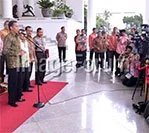WHEN he campaigned for the post of president of Indonesia, Joko Widodo, or better known as Jokowi, sought the widest mandate he could get from the Indonesian public at large.
The campaign last year witnessed an outpouring of support from ordinary Indonesians from all walks of life, from university students to mass movements to the ordinary public. Campaigning on a populist reform ticket, he narrowly won the elections on the basis of promises to improve Indonesia’s economy and clean up the political system.
Few could have imagined that in a matter of months, he would incur the anger of many of his supporters, who now feel that he is not his own man.
To be sure, some of his populist policies have gained him wide support. The tough stand that Indonesia has taken on the issue of foreign fishing vessels fishing in Indonesian waters has proven to be a popular one, despite the fact that the act of destroying b oat s from neighbouring countries may have long-term implications for Indonesia and Asean as a whole.
Indonesian President Joko Widodo delivering a statement following a meeting at the presidential palace in Bogor, in which the arrest of anti-graft official Bambang Widjojanto was discussed. AFP pic
But the past week has witnessed a different kind of crisis altogether, one that is entirely domestic in its scope, but serious in its implications. The tussle between the Indonesian Anti-Corruption Agency (KPK) and the state’s police force began when KPK alleged that the candidate for the post of chief of police, General Budi Gunawan, was a graft suspect. In a matter of days, KPK’s deputy chief, Bambang Widjojanto, was, in turn, arrested by police for alleged perjury. The row between the two sides has led to demonstrations and calls from local monitoring groups for the president to intervene and save KPK from harassment.
This crisis has marked the nadir of Jokowi’s short political adventure so far: across the country, many Indonesian opinion-makers have opined that the president is bowing to pressure from his own party, and that he is unable to further his own agenda of reform and anti-corruption.
Coming at a time when public faith in state institutions is low, the crisis threatens to tarnish the image of Jokowi in no uncertain terms. Worst of all, it feeds into the opposition’s rhetoric -most vocally articulated during last year’s election campaign -that Jokowi is not his own man, and has to bow to other pressures that remain unseen and undeclared.
For seasoned Indonesian commentators, like Endy Bayuni of The Jakarta Post, it seems as if “the president is beholden to the powerful interests that helped him get elected. This means that he constantly has to fight his battles with them. While he has prevailed in some of the debates, because he is the elected president, he is also losing some of the other battles, when the various interest groups gang up on him”.
Senior commentators like Bayuni believe Jokowi “should be given more time to bring those powerful interests under control, and to show them who is the boss”. But for now, at least, Jokowi’s somewhat ambivalent stand is not helping him shore up the popular support he had carefully cultivated, and the cost of these successive crises has been high in political terms.
Article by Dr Farish Noor which appeared in New Straits Times, 27 January 2015.





